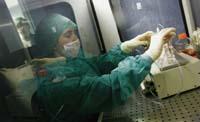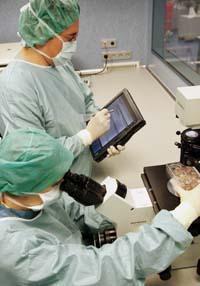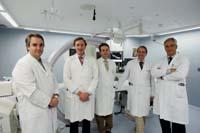Stem cells to heal the heart

A team of cardiologists from the Clínica Universitaria de Navarra, in collaboration with the Department of Cellular Therapy and the Gregorio Marañón Hospital in Madrid, is conducting a clinical trial. The effectiveness of adult stem cell transplantation is being studied in 50 patients who have had a heart attack. In this case, adult stem cells of myoblasts or muscle cells have been used. The main novelty of this work is that these stem cells are introduced by catheters and not by open intervention as in trials of this type. This novel technique has already been tested in different animal experiments. This is a work approved by the Spanish Medicines Agency and the certification of this official body assumes that the research meets the legal, ethical and patient safety requirements.
Patients who have participated and will participate in this study have had a myocardial infarction, currently with ventricular dysfunction. They are also required not to have any other treatment, so the results are purer.
Cell culture
First, it is necessary to remove the stem cells --mioblasts- from the muscle tissue of the patient's leg by biopsy. This work uses local anesthesia. Researchers isolate adult stem cells from the sample of this muscle tissue, which allow them to grow or reproduce in a specific growth medium for about a month, until they have the cells necessary to perform the transplant.
This cell growth is performed in the laboratory GMP (Good Manufacturing Practice) of the University Clinic of Navarra. Unlike other growth research, the patient's own serum is used in the culture of these cells, so the risk of adverse reactions is reduced (in general, they use animal serum in other research). Thus, according to Juan José Gavira, cardiologist of the University Clinic of Navarra, possible infections, allergies or immune reactions are avoided by not incorporating foreign proteins.

After about a month, these cultured cells are introduced into the patient's heart by catheterization, that is, by a special injection catheter. They integrate the cells into the heart muscle that has suffered a heart attack and in its vicinity. However, previously, a sample of these mature stem cells is analyzed in the microbiology laboratory to detect possible infections and ensure their health.
Insertion of myoblasts requires anatomical reproduction of the left ventricle. In fact, cardiologist Joaquín Barba has explained that the left ventricle is greater than the left and has greater importance in pumping blood. Therefore, left ventricular infarctions are more severe and alter the patient's prognosis more significantly. Therefore, stem cells are inserted in this field.
Virtual reproduction is done through a navigation system called non-fluoroscopic electroanatomical mapping. This technique allows rebuilding the left ventricle in three dimensions. Below are the low voltage zones of the area. They are areas without electrical activity and anatomically reflect myocardial infarction. In this ventricular modality obtained thanks to the navigation system, they identify the area affected by the infarction, according to Ignacio García Bolao, cardiology expert at the University Clinic of Navarra.

It is at this point or area where stem cells must be inserted. This whole process is done through a catheter with a very fine and enveloping needle at its end. In general, catheterization is done from the femoral artery to the specific place of the heart where the cells are to be inserted. There 15 or 20 mioblasts injections are applied. All under local anesthesia, with the patient awake and lasting two or three hours. So far, 14 patients have been tested, with satisfactory results in all of them.
This technique, still in preparation, aims to check the effectiveness of this new treatment and to check if the functioning of the heart of patients who have suffered a myocardial infarction is improved.





